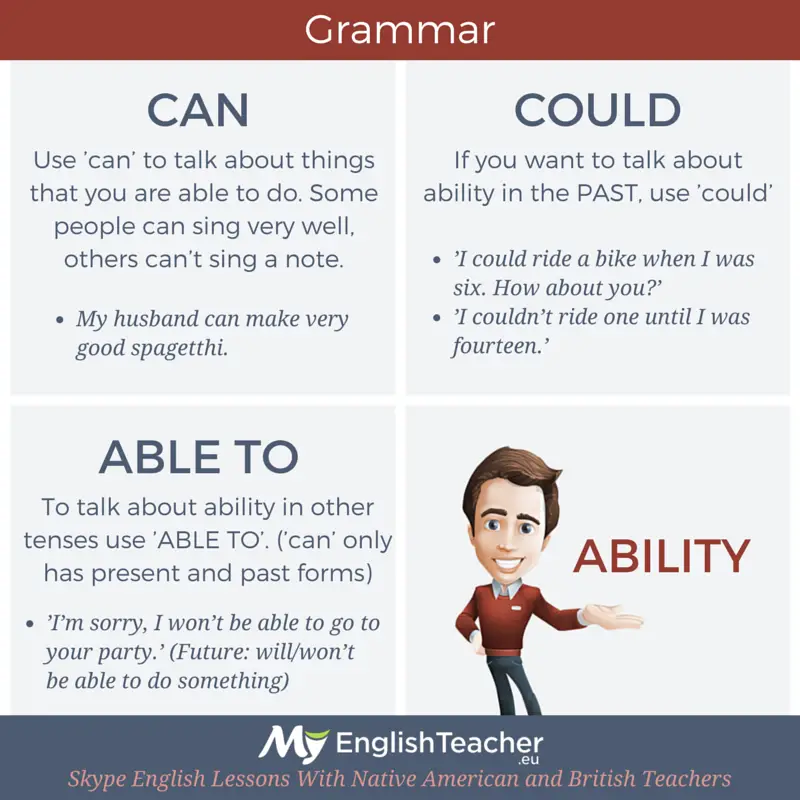Plus:
- can vs could vs may vs might
- can vs could vs would
- can vs could vs be able to
SHALL
[Tweet “’Shall’ is used when making suggestions or offering help. It is only used in the first person singular (I) and plural ( we).”]
’Shall’ is used when making suggestions or offering help. It is only used in the first person singular (I) and plural ( we).
SUGGESTIONS
- ’Shall we go to the cinema tonight?’
’That’s a great idea. Which cinema shall we go?’
’Let’s go to Odeon.’
- ’Shall we have a coffee break?’
’That would be nice. I’m getting tired.’
OFFERING HELP
- ’These bags are too heavy.’
’Shall I carry them for you?’
- ’I don’t know if they have any tickets left.’
’Shall I call the organizers?’
Recommended for you:
The Difference Between SHALL and WILL
English Grammar: Usage of Shall vs Should with Examples
CAN vs COULD
’Can’ and ’could’ have many different functions:
ABILITY
Use ’can’ to talk about things that you are able to do. Some people can sing very well, others can’t sing a note. Athletes can run very fast and chefs can cook really well.
- ’Shall we go on a boat trip?’
’Sorry, I’d prefer to stay on the beach. I can’t swim.’
- ’My husband can make very good spagetthi.’
’You’re lucky. My husband can’t cook at all.’
- ’Can your son ride a bicycle?’
’Yes, he can. He learnt how to ride last year.’
- ’Help him. He can’t breathe.’ (not a general ability, it’s happening NOW)
- ’Where’s Chris? I can’t see him anywhere.’ (not a general ability, it’s happening NOW)
If you want to talk about ability in the PAST, use ’could’.
- ’I could ride a bike when I was six. How about you?’
’I couldn’t ride one until I was fourteen.’
- ’My daughter could speak when she was one.’
’That’s incredible. My son couldn’t speak until he was three.’
To talk about ability in other tenses use ’ABLE TO’. (’can’ only has present and past forms)
- ’I’m sorry, I won’t be able to go to your party.’
(Future: will/won’t be able to do something)
- ’I haven’t been able to talk to him since the accident.’
(Present Perfect: have/has been able to do something)
Recommended for you:
Can vs Able To!
Can Could with Many Examples
Use ’ABLE TO’ for INFINITIVES and GERUNDS
- ’I want to be able to speak five languages.’
- ’I love being able to communicate with so many people.’
You can also use ’ABLE TO’ in the Present and the Past, but they sound a bit more formal.
- ’No matter what I do, I’m not able to quit smoking.’
- ’She wasn’t able to look me in the eye.’
Use ’able to’ with modal verbs.
- ’You should be able to do that on your own by now.’
- ’He’s an electrician. He must be able to fix this lamp.’
ASKING FOR SOMETHING
[Tweet “Use ’CAN’, ’COULD’ and ’MAY’ when asking for permission. ’MAY ’ is considered formal- people usually just say ’Can I…?’”]
Use ’CAN’, ’COULD’ and ’MAY’ when asking for permission. ’MAY ’ is considered formal– people usually just say ’Can I…?’ or more politely ’Could I…?’
- ’ Can I possibly use your phone?’
’Of course. No problem.’
- ’Could I take tomorrow afternoon off?’
’Sure. Just tell Susie about it.’ - ’May I wait here?’
’I’m afraid, Sir, you’ll have to wait downstairs.’
MAKING REQUESTS
[Tweet “’CAN’ , ’COULD’, ’WILL’ and ’WOULD’ are also used when asking somebody to do something for you. “]
’CAN’ , ’COULD’, ’WILL’ and ’WOULD’ are also used when asking somebody to do something for you.
’COULD’ and ’WOULD’ are considered more polite.
- ’Can you get me some coffee on the way back?’
- ’Can you sign it here, please?’
- ’Will you wait here until I call you?’
- ’Could you tell me the time, please?’
- ’Would you call back later, please?’
POSSIBILITY
[Tweet “When you are sure or not so sure about something, use ’MUST’, ’MAY’, COULD’, ’MIGHT’ and ’CAN’T’”]
When you are sure or not so sure about something, use ’MUST’, ’MAY’, COULD’, ’MIGHT’ and ’CAN’T’ to express different levels of certainty.
- ’Is that Jack at the door?’
’Yes, it must be him.’ (the speaker is 100% sure)
’No, it can’t be him. He’s at work.’ (the speaker is 100% sure)
- ’Can you buy some more wine, please? Susan and her husband may pop in later.’ (the speaker is about 50% sure)
- ’I might visit her when I’m in Paris.’ (the speaker is about 30% sure)
- ’Have you find your glasses?’
’I haven’t. They could be in the car.’ (it is just one of many possibilities)



























